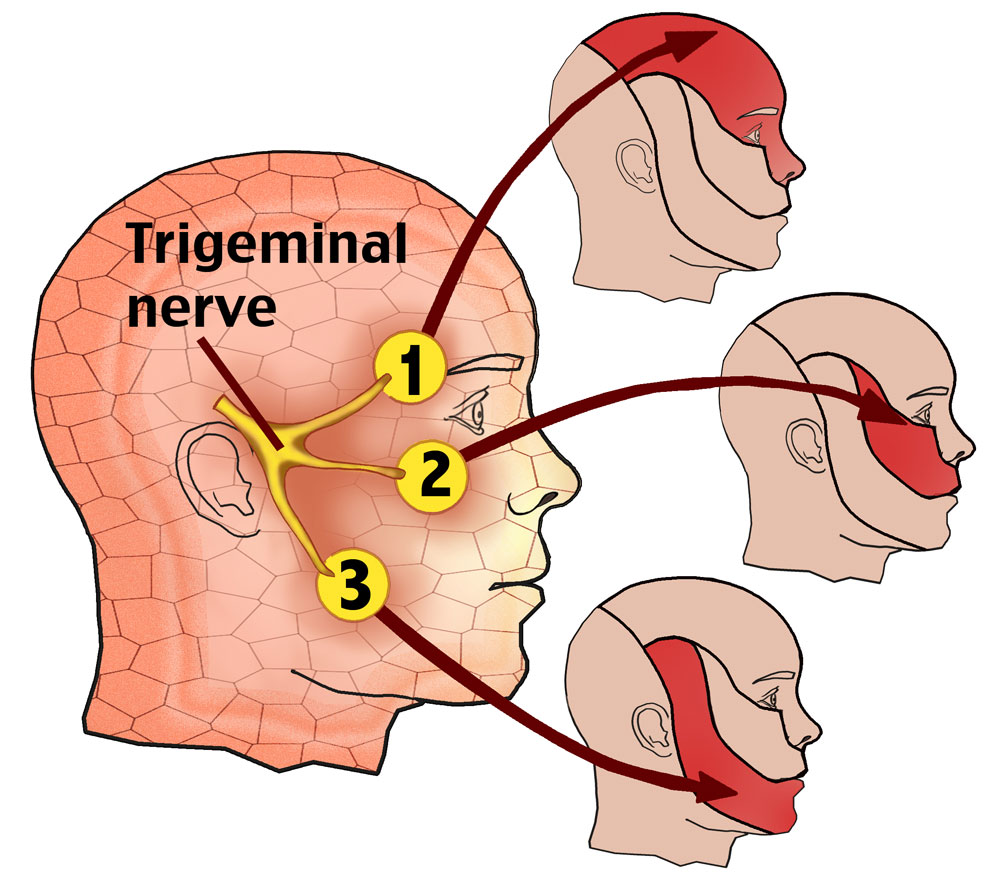Page Contents
- 1 WHAT IS IT?
- 2 WHAT CAUSES IT?
- 3 WHY IS IT A PROBLEM?
- 4 WHAT MAKES US SUSPECT IT?
- 5 CLINICAL WORKUP
- 6 AT WHAT POINT DO WE CONFIDENT IN MAKING THE DIAGNOSIS?
- 7 WHAT ELSE ARE WE WORRIED ABOUT?
- 8 HOW DO WE TREAT IT?
- 9 HOW WELL DO THE PATIENTS DO?
- 10 WAS THERE A WAY TO PREVENT IT?
- 11 ARCHIVE OF STANDARDIZED EXAM QUESTIONS
- 12 FURTHER READING
WHAT IS IT?
Trigeminal neuralgia (tic douloureux) refers to nerve pain that originates from the trigeminal nerve (cranial nerve V).

WHAT CAUSES IT?
The exact triggers for this neurogenic pain often can be unknown (some believe it has to do with nerve compression/irritation), however conditions such as multiple sclerosis can (in some cases) present with trigeminal neuralgia.
WHY IS IT A PROBLEM?
This condition is painful and irritating to patients
WHAT MAKES US SUSPECT IT?
Risk factors
Female sex
Common Chief Complaints:
- Facial pain (episodic)
History Of Present Illness
- Onset: very sudden onset of pain
- Triggers: movement of face (speaking, chewing, brushing teeth)
- Quality of pain: descriptors such as severe, intense, burning, or electric/shock-like are commonly used to describe it.
- Region of pain: jaw, forehead, scalp, around eyes/lips
- Timing of pain: the episodes of pain are short (< 1 minute) and can occur many (10-1000 times) in one day.
- Associated symptoms: allodynia of the face may be noted.
Physical Exam Findings
Generally there will not be any physical exam findings (unless the patient has a underlying condition like multiple sclerosis that is causing the trigeminal neuralgia)
CLINICAL WORKUP
Magnetic resonance imaging may be obtained if there is concern for pathology in the cranium.
AT WHAT POINT DO WE CONFIDENT IN MAKING THE DIAGNOSIS?
This is often a clinical diagnosis (especially in the absence of any history/physical exam findings that suggest a serious underlying cause.
WHAT ELSE ARE WE WORRIED ABOUT?
Multiple sclerosis: this is a serious condition that could potentially be responsible for causing triigmeinaal neuralgia in a patient.
HOW DO WE TREAT IT?
Anticonvulsants will not cure this condition, but can help manage it:
- Carbamazepine is the medication of choice for this condition.
- Phenytoin can also be used
- Topiramate is also an option
If medications do not work, more aggressive options can be explored:
- Surgery
- Gamma knife radiation
HOW WELL DO THE PATIENTS DO?
This condition can not be cured with medical management, and patients have a variable response/prognosis
WAS THERE A WAY TO PREVENT IT?
N/A
ARCHIVE OF STANDARDIZED EXAM QUESTIONS
This archive compiles standardized exam questions that relate to this topic.
FURTHER READING
Page Updated: 08.05.2016